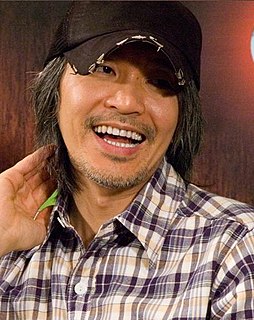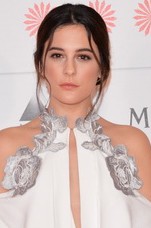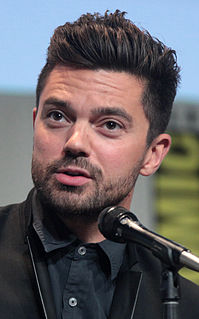A Quote by Ben Kingsley
The camera does not like acting. The camera is only interested in filming behaviour. So you damn well learn your lines until you know them inside out, while standing on your head!
Related Quotes
A huge part of what we do as actors is learning to ignore the camera, as if it's not even there, while simultaneously being very aware of the camera and what it's capturing, because you can give the best performance of your life, but if you do it with the back of your head facing the camera, it's going to get cut from the movie.
No matter what kind of significance leads you do, you learn a lot from doing schlock. The setup's the same, only you have to work twice as hard to make it the best as you can make it. And a lot of acting is not about acting but technology. Are you standing in your light? Are you out of your light? And if the sound guy's near you, please don't put the coffee cup down at that moment, because you're covering your lines. All of that stuff's going on in your head, so you learn a lot by doing whatever. In my view, never worry that something's not prime - A, number - one stuff.
Of course, you can never watch something like somebody else watches something like you, but nonetheless, you have to try. So I think on camera you learn a lot about how much the camera does for you, which is what is the great luxury of movie acting. Or acting whether it's TV or movies or whatever it is, that the camera's really such a gift because there's so much that it sees and does if you're willing to just be open and expose yourself and all of that. So you also learn what doesn't matter. And sometimes when you think about things, you think things matter that don't matter.
When I was an actor in some movies a long time ago, I was so curious about all the camera movements - why is the camera placed here, and why does it move like this? And why the set and the background, the color? It's a lot of questions for me to ask, because I was so interested, not only in acting, but also the whole process of filmmaking.
In the theater, you're so much more in charge as an actor. For better or for worse, you know what the audience is seeing. But you can be acting your socks off on film, and then you see the movie, and the camera is on the other actor, or they've cut out the lines you thought were significant, or they've adjusted the plot. So much of it is out of your control.
The difference between an amateur and a professional photographer is that the amateur thinks the camera does the work. And they treat the camera with a certain amount of reverence. It is all about the kind of lens you choose, the kind of film stock you use… exactly the sort of perfection of the camera. Whereas, the professional the real professional – treats the camera with unutterable disdain. They pick up the camera and sling it aside. Because they know it’s the eye and the brain that count, not the mechanism that gets between them and the subject that counts.
The camera course was a bit crap. But when I was in drama school, I wasn't interested. I wanted to be a stage actress. I was not interested in learning camera craft. But then you throw yourself in the deep end when you do get a job in front of the camera because you have absolutely no idea what you're doing, and it is a skill.
There's this exhausting energy from you getting your lines out and your words right, especially if it's a complicated scene. And as soon as the camera is off you and goes on the other person, you're talking garbled garbage and you feel so sorry for them because you've lost the will to live, after 18 hours of saying those lines. That's terribly unfair. So, I do love the quick-paced nature of it.



































